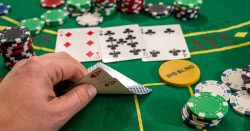Unraveling the Mystery of Bluffing in Poker
If you have ever watched a poker tournament on television, you will know just how important it is to be able to pick the right moments to bluff.
While there is no better feeling in poker than picking up a pot with a hand that should generally be mucked, achieving the feat is not easy.
Bluffing is one of the elements that makes poker a skill game rather than a game of chance and is a vital part of every player’s armory.
Knowing how and when to bluff will help to elevate your poker play to a whole new level. Read on as we take a closer look at bluffing.
An Introduction to Bluffing
In simple terms, a bluff in poker is where you make a bet or raise with a hand that normal logic would suggest you should not play.
It is a move where you are trying to convince your opponent that your hand is much stronger than it actually is with the aim of stealing the pot.
From a strategic perspective, bluffing is designed to take advantage of situations where players are involved in pots they perhaps shouldn’t be.
While a good bluff will often induce a fold from players who are not confident about the strength of their hand, timing is undoubtedly everything.
Correct Bet Sizing is Imperative
The size of your bet is a crucial part of bluffing. If your bet is too small you potentially create a scenario where it is cheap enough for your opponent to call.
Conversely, if you make a massive overbet, it is highly likely that more skilled players will recognize what you are attempting to pull off and punish you.
Bet sizing ultimately boils down to the size of the pot when you make your move, how many opponents you are up against, and your position at the table.
One of the best ways to think about the size of your bet when bluffing is to wager in exactly the same way as if you had a premium hand.
Choose Your Spots Carefully
Regardless of whether you play cash games or tournaments, choosing the right moment to attempt a bluff is crucial to whether it will be successful.
Before you embark on a bluff, think carefully about the situation in the game and consider whether the move has a genuine chance of working.
When attempting a bluff, you are betting on the strength (or lack thereof) of your opponent’s hand rather than the strength of your own.
If you are trying to convince an opponent that your hand is stronger, make sure that your play throughout the betting rounds backs up this stance.
Never Show Your Bluffs
Any player who wants to be successful at poker should limit the amount of information they give to their opponents.
On that basis, while it may be amusing to show everyone that you have bluffed a big pot, you should resist the temptation at all costs.
The ultimate aim in poker is to take chips off the other players – the less information they have about your play, the better your chances of winning.
By keeping your opponents guessing, you can bluff them successfully more often than if you share information with them.







